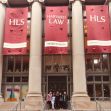Even though the Centers for Disease Control (CDC) has reduced the time COVID-19 sufferers need to isolate, time has not been reduced for COVID-based lawsuits. This week, a California appellate court decided that college students who filed a class action suit asking for tuition refunds because they were promised “in-person instruction,” failed to prove their case.
Samantha Berlanga, Joseph Oliva and Jasmine Moore were students at the University of San Francisco (USF) during the Spring 2020 semester when they had to attend classes via remote, online learning. The University took this action following Governor Gavin Newsom’s declaration of a state of emergency designed to protect Californians from the pandemic. In March 2020, the San Francisco Health Officer issued a “shelter-in-place” order that led to the USF’s transition to distance learning for the remainder of the Spring semester, and remote instruction was later extended into the Fall semester as well.
Two different class action suits were filed by USF student-plaintiffs who claimed the University breached their contract in violation of the California Unfair Competition Law (Business and Professional Code § 17200 (the Code) et. seq.), as well as quasi-contract and promissory estoppel. Oliva also filed a separate action alleging not only breach of contract but also unjust enrichment and conversion. The two suits were later consolidated into a single class action suit.
The Code section “prohibits any unlawful, unfair, or fraudulent business act or practice” as well as “unfair, deceptive, untrue or misleading advertising.” The quasi-contract cause of action would cover obligations outside the contract between students and the university. Promissory estoppel, a legality within contract law, says that a party can recover “on the basis of a reasonable promise made and relied on. To complete the definitions, unjust enrichment is a term for benefiting at another party’s expense, and conversion is an intentional tort that occurs when one takes the property of another with “the intent to deprive them of it.”
USF moved for summary judgment, primarily because of the State’s COVID-related mandates of which the students were aware. Plaintiffs opposed the motion based on their contracts with USF. Their case relied on language in their acceptance letters and other USF publications, such as course catalogs, which said how much they would enjoy and learn at the University. One key argument was that in several printed materials USF represented itself as a “residential university, offering in-person instruction and on-campus facilities.”
San Francisco Superior Court Judge Andrew Y.S. Cheng granted USF’s breach of contract motion and all other causes of action except the one based on the Code. The students dismissed this cause in order to obtain an immediate appeal. Cheng noted that the letters to students from USF “do not contain any promise of in-person instruction, nor do they contain unqualified promises of exclusively in-person instruction during an emergency like the COVID pandemic.” He also said that other publications such as course catalogs “cannot give rise to a binding agreement for in-person instruction.” This also applied to professors’ syllabi. Thus he found no breach that could raise a triable issue of fact.
Members of the class appealed to a three-justice panel from Division Three of California’s First District Court of Appeal, which unanimously affirmed Cheng’s ruling. The unanimous opinion, authored by Justice Iona Petrou with concurrences by Presiding Justice Carin T. Fujisake and Justice Victor Rodriguez, began with a discussion of the requirements for a successful breach of contract suit. Justice Petrou explained that since neither party denied there was an implied-in-fact contract between USF and the students, the issue was whether the contract required USF to provide exclusively in-person instruction. She said that this was “a question of fact for the trier of fact unless the underlying facts are undisputed and support only one conclusion.”
The justices found that, unlike several cases that the plaintiffs cited as precedent, USF made no “unequivocal statements” about in-person instruction. Rather, all their statements were generalities. The students also failed to provide historical evidence that showed the University had provided in-person instruction during previous health or safety emergencies. Petrou added that these statements also were not implied contracts. She also wrote, “…generalized statements fail to delineate the specific terms under which the universities were offering in-person instruction or campus access as required by California law.” Thus, there was no triable issue of fact.
The students also asked for tuition reimbursements for both the Fall 2020 and Spring 2021 semesters. The appellate court, again, was not persuaded, saying that by this time, the students “were aware of the remote learning orders and the University’s plan on how to meet them.” Petrou wrote that USF’s “switch from in-person to remote instruction, as required by state and local stay-at-home orders, did not frustrate appellants’ right to any contract benefits and thus did not violate the implied covenant of good faith and fair dealing.”
Similarly, the quasi-contract claims and promissory estoppel claims, which relied on the same evidence, also failed to provide any triable issues of fact. The trial court’s motion for summary judgment was affirmed and, presumably, the students have graduated and moved on by now, with the benefits of the knowledge they hopefully gathered in their remote classes.






